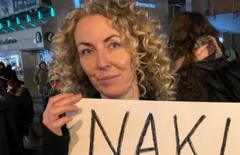The protest, organized by ROSA in honor of International Day for the Elimination of Violence against Women, called for accountability and drew attention to the failure to pursue criminal charges against McGregor.
Several hundred protesters took to the streets of Dublin in support of Nikita Hand after a jury found that Conor McGregor had raped her in December 2018. The civil case resulted in a ruling that McGregor must pay nearly €250,000 in damages. Many attendees expressed frustration with the Irish director of public prosecutions (DPP) for not filing criminal charges against McGregor, with one speaker, Natasha O’Brien, encouraging other victims to maintain hope and fight for justice.
The march began at Dublin city hall, following a route along the River Liffey to the DPP's office. Participants carried signs advocating for women's rights and safety, and highlighted the societal concerns surrounding women's safety in various environments. Donna McCarthy, who traveled from County Kerry for the protest, denounced the DPP's decision not to pursue criminal charges as "absolutely disgraceful," stating that it has significant implications for women's sense of safety.
Another protester, Deirdre De Feu, emphasized that women's safety is a collective concern, citing the urgent need for solidarity among women. The protest garnered attention not only for Hand's case but also for the broader challenges victims face within the justice system. Victim advocates argued that the DPP's determination of "insufficient evidence" undermines the belief in women's accounts of violence.
The outgoing Irish justice minister, Helen McEntee, defended the independence of the DPP’s decision-making process, insisting that it is crucial to respect this autonomy in the justice system. Meanwhile, Hand's plight serves as a rallying cry for activists fighting against sexual violence, hoping her case motivates other victims to come forward. The discourse over women's rights and safety remains paramount in the wake of this high-profile case, as advocates strive for a cultural shift in addressing such issues.
Several hundred protesters took to the streets of Dublin in support of Nikita Hand after a jury found that Conor McGregor had raped her in December 2018. The civil case resulted in a ruling that McGregor must pay nearly €250,000 in damages. Many attendees expressed frustration with the Irish director of public prosecutions (DPP) for not filing criminal charges against McGregor, with one speaker, Natasha O’Brien, encouraging other victims to maintain hope and fight for justice.
The march began at Dublin city hall, following a route along the River Liffey to the DPP's office. Participants carried signs advocating for women's rights and safety, and highlighted the societal concerns surrounding women's safety in various environments. Donna McCarthy, who traveled from County Kerry for the protest, denounced the DPP's decision not to pursue criminal charges as "absolutely disgraceful," stating that it has significant implications for women's sense of safety.
Another protester, Deirdre De Feu, emphasized that women's safety is a collective concern, citing the urgent need for solidarity among women. The protest garnered attention not only for Hand's case but also for the broader challenges victims face within the justice system. Victim advocates argued that the DPP's determination of "insufficient evidence" undermines the belief in women's accounts of violence.
The outgoing Irish justice minister, Helen McEntee, defended the independence of the DPP’s decision-making process, insisting that it is crucial to respect this autonomy in the justice system. Meanwhile, Hand's plight serves as a rallying cry for activists fighting against sexual violence, hoping her case motivates other victims to come forward. The discourse over women's rights and safety remains paramount in the wake of this high-profile case, as advocates strive for a cultural shift in addressing such issues.





















